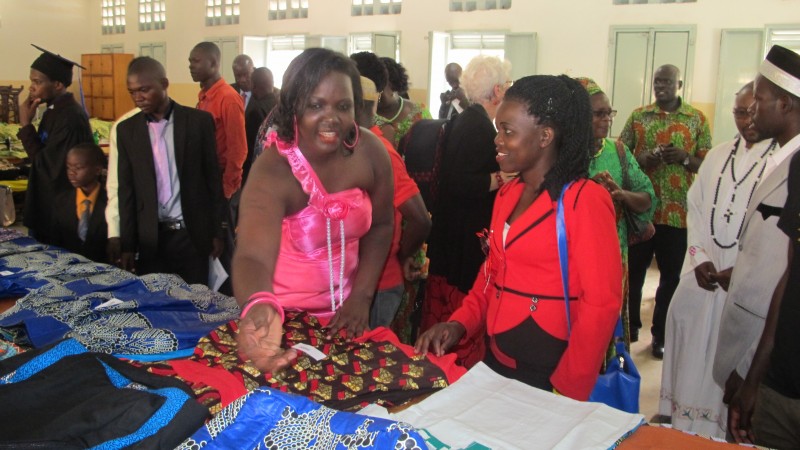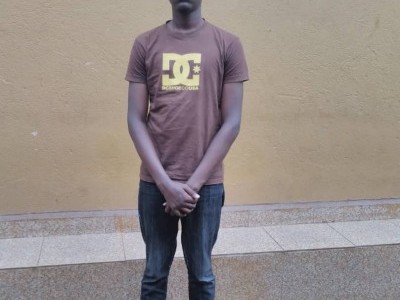
Education
Providing Skills Training for Child Mothers
UGX 5,000.00 raised of UGX 18,000,000.00 goal 0.03%- 1 Donation
- Finalized
- 0 Likes
Campaign Ended!
Share on
This project supports vocational training for women and girls with a focus on income generation and supporting livelihoods in local communities. It empowers disadvantaged women to create their own businesses and manage their finances.
Project Background
From child headed families to supporting child mothers, we want to empower, rebuild hope and fuel the dream of this target population with lifelong vocational and skills building program so they can see their dream come to life.
Yes, we all know that, Government efforts like the Youth Livelihood Programme, National Youth Venture Fund, Northern Uganda Social Action Fund Youth Opportunities Program have been instrumental in helping a cross section of youth in areas of enterprise development, job creation, and business skills training. However, these initiatives have not fully addressed the access barriers that the youth especially in rural areas face.
For a country like Uganda which is already faced with an unemployment crisis with most of the youth population graded as having low skilled and largely dependent on Small and Medium Enterprises (SMEs) which are at a risk of collapsing and bound to struggle in any economic drain, our own fundamental questions are: How can we ensure that jobs are accessible to the youth population? How can we ensure that economic recovery places Small and Medium Enterprises at the center stage? How do we skill our youth to be self-starters with the ability to compete regionally?
As Dream Foundation we want to position ourselves in responding to the needs of the youth by empowering them with vocational and life skills, financial, entrepreneurship and business management skills so they are bale to create, manage and sustain their small scale enterprises in whichever field they decide to opt up with. Its imperative to note that, entrepreneurship initiatives mainly focused on supporting the resilience of youth-led SMEs that are the largest employers of the young people as an engine to economic recovery is key for a majority youth like it is the case of Northern Uganda to thrive.
Businesses and ventures geared towards igniting the human capital like this that we seek to embark on cannot wait to kick off the COVID-19 had settled. However, cash incentives that offer opportunities for apprenticeship and internship will be the ultimate life support needed having learnt lessons from the failed financial interventions government has encountered in the past with little or no impact at all.
It is our belief that well trained young people can successfully contribute to the growth and development of SMEs by delivering structured support services. The cost of this opportunity is relatively low yet it provides market-led skills development, and offers a return on investment through both the employment opportunities for young participants and the economic contributions they make to SMEs over the long term.
Unemployment in Uganda at large
Planning for and creating employment opportunities for this largely young and youthful population is a developmental challenge that should be placed high on the countries development agenda given the fact that, majority of the youth (70 percent) reside in rural areas where decent employment and entrepreneurial opportunities remain limited.
Education and Skills: despite government’s efforts to boost education through UPE, USE and other programmes, the largest proportion of the labour force in Uganda lacks adequate and appropriate education and skills. Over 18 percent of the population aged 9 years and above has never been to school and only 12 percent have attended secondary school (see figure 1 below). For the youth, 7.3 percent of them have never been to school while 18.5 percent are illiterate (lacking the ability for to read with understanding and to write a simple sentence meaningfully in any language). Source: UBOS, 2016.
In Northern Uganda where we intend to carry out our project work all we know is that schools are severely under resourced, teachers are poorly trained and not present throughout the school year, and school attendance and literacy rates of children are low. Girls in particular are often not supported to attend school and parents have less interest towards their children getting better education or may not be able to provide them with enough educational resources.
Project Aim
This project aims to increase the capacity of disadvantaged young girls and women in the Gulu district to become trained workers, providing them with employable skills and the opportunity to be leaders within their communities. Through this training, it aims to help alleviate poverty, enable economic independence and help increase the self-esteem of vulnerable women and girls in the community. It also includes the opportunity of financial literacy training to ensure these women are well equipped to manage their own businesses and finances.
The training will provide skills in practical trades to enable them to find work in their communities and help them support themselves and their families. The areas of training are chosen by the women and girls involved, with a realistic view of what employment they would be able to gain or businesses they could start within their villages once they have completed their education.
Key Project Objectives
The long-term program objectives include:
The project costs provide vocational training for identified women and girls from these remote communities. This training also includes training in financial literacy and a 3-month mentoring opportunity.
Costs include fees for team from Dream foundation to travel across the region to identify training recipients, costs fees for the trainers, relevant training materials, teaching aids and administration.
How This Project Fits into a Larger Strategy?
This project complements the existing Uganda Vocational Qualification Framework (UVQF), Skilling Uganda and Workers Pass Qualifications all Under the Ministry of Education through the Directorate of Industrial training providing vocational opportunities for young women and girls to receive training in employable trades post-school. Overall goal is to ensure that the populace have better opportunities in life through inclusive, high quality education’ and ‘Nepal’s citizens achieve higher living standards and contribute to sustainable development of their country’.
we need to raise 18,000,000/= (4,800USD) to help us establsih a practical skill set academy for child mothers, girls and women in our area to aquire practical skills to aid their survival.
Project Background
From child headed families to supporting child mothers, we want to empower, rebuild hope and fuel the dream of this target population with lifelong vocational and skills building program so they can see their dream come to life.
Yes, we all know that, Government efforts like the Youth Livelihood Programme, National Youth Venture Fund, Northern Uganda Social Action Fund Youth Opportunities Program have been instrumental in helping a cross section of youth in areas of enterprise development, job creation, and business skills training. However, these initiatives have not fully addressed the access barriers that the youth especially in rural areas face.
For a country like Uganda which is already faced with an unemployment crisis with most of the youth population graded as having low skilled and largely dependent on Small and Medium Enterprises (SMEs) which are at a risk of collapsing and bound to struggle in any economic drain, our own fundamental questions are: How can we ensure that jobs are accessible to the youth population? How can we ensure that economic recovery places Small and Medium Enterprises at the center stage? How do we skill our youth to be self-starters with the ability to compete regionally?
As Dream Foundation we want to position ourselves in responding to the needs of the youth by empowering them with vocational and life skills, financial, entrepreneurship and business management skills so they are bale to create, manage and sustain their small scale enterprises in whichever field they decide to opt up with. Its imperative to note that, entrepreneurship initiatives mainly focused on supporting the resilience of youth-led SMEs that are the largest employers of the young people as an engine to economic recovery is key for a majority youth like it is the case of Northern Uganda to thrive.
Businesses and ventures geared towards igniting the human capital like this that we seek to embark on cannot wait to kick off the COVID-19 had settled. However, cash incentives that offer opportunities for apprenticeship and internship will be the ultimate life support needed having learnt lessons from the failed financial interventions government has encountered in the past with little or no impact at all.
It is our belief that well trained young people can successfully contribute to the growth and development of SMEs by delivering structured support services. The cost of this opportunity is relatively low yet it provides market-led skills development, and offers a return on investment through both the employment opportunities for young participants and the economic contributions they make to SMEs over the long term.
Unemployment in Uganda at large
Planning for and creating employment opportunities for this largely young and youthful population is a developmental challenge that should be placed high on the countries development agenda given the fact that, majority of the youth (70 percent) reside in rural areas where decent employment and entrepreneurial opportunities remain limited.
Education and Skills: despite government’s efforts to boost education through UPE, USE and other programmes, the largest proportion of the labour force in Uganda lacks adequate and appropriate education and skills. Over 18 percent of the population aged 9 years and above has never been to school and only 12 percent have attended secondary school (see figure 1 below). For the youth, 7.3 percent of them have never been to school while 18.5 percent are illiterate (lacking the ability for to read with understanding and to write a simple sentence meaningfully in any language). Source: UBOS, 2016.
In Northern Uganda where we intend to carry out our project work all we know is that schools are severely under resourced, teachers are poorly trained and not present throughout the school year, and school attendance and literacy rates of children are low. Girls in particular are often not supported to attend school and parents have less interest towards their children getting better education or may not be able to provide them with enough educational resources.
Project Aim
This project aims to increase the capacity of disadvantaged young girls and women in the Gulu district to become trained workers, providing them with employable skills and the opportunity to be leaders within their communities. Through this training, it aims to help alleviate poverty, enable economic independence and help increase the self-esteem of vulnerable women and girls in the community. It also includes the opportunity of financial literacy training to ensure these women are well equipped to manage their own businesses and finances.
The training will provide skills in practical trades to enable them to find work in their communities and help them support themselves and their families. The areas of training are chosen by the women and girls involved, with a realistic view of what employment they would be able to gain or businesses they could start within their villages once they have completed their education.
Key Project Objectives
The long-term program objectives include:
- Increased female access to educational training and opportunities
- Increased female workplace participation in remote, rural areas
- Improved economic independence of women and girls in remote, rural areas
- Increases leadership opportunities for women and girls within the community.
- This independence fundamentally alters their lives and the lives of their children.
- Through this project woman in Northern Uganda should find room to be self-reliant.
The project costs provide vocational training for identified women and girls from these remote communities. This training also includes training in financial literacy and a 3-month mentoring opportunity.
Costs include fees for team from Dream foundation to travel across the region to identify training recipients, costs fees for the trainers, relevant training materials, teaching aids and administration.
How This Project Fits into a Larger Strategy?
This project complements the existing Uganda Vocational Qualification Framework (UVQF), Skilling Uganda and Workers Pass Qualifications all Under the Ministry of Education through the Directorate of Industrial training providing vocational opportunities for young women and girls to receive training in employable trades post-school. Overall goal is to ensure that the populace have better opportunities in life through inclusive, high quality education’ and ‘Nepal’s citizens achieve higher living standards and contribute to sustainable development of their country’.
we need to raise 18,000,000/= (4,800USD) to help us establsih a practical skill set academy for child mothers, girls and women in our area to aquire practical skills to aid their survival.
-

Amony donated Shs5,000
Related Campaigns
Take a look at other campaigns in the same category.

Education
 by MUJUNI MEDARD
There is no time anymore-1456
by MUJUNI MEDARD
There is no time anymore-1456
TO HELP A PRIMARY SEVEN GIRL.
It's a good cause. She is in primary seven and she needs your hand . may God gra...
UGX 0
0.00%
raised of UGX 360,000

Education
 by St. Mary's Ediofe Girls
There is no time anymore-1456
by St. Mary's Ediofe Girls
There is no time anymore-1456
Buy A Brick, Build SMEGSS
St. Mary's Ediofe Girls' Secondary School (SMEGSS) of Arua, Uganda was founded i...
UGX 0
0.00%
raised of UGX 72,000,000

Education
 by Nyakarungi cissy
There is no time anymore-1456
by Nyakarungi cissy
There is no time anymore-1456
School fees
Fatmil Said is a Ugandan and a student at kibibi Muslim. He is in s.4. He wishes...
UGX 0
0.00%
raised of UGX 1,500,000